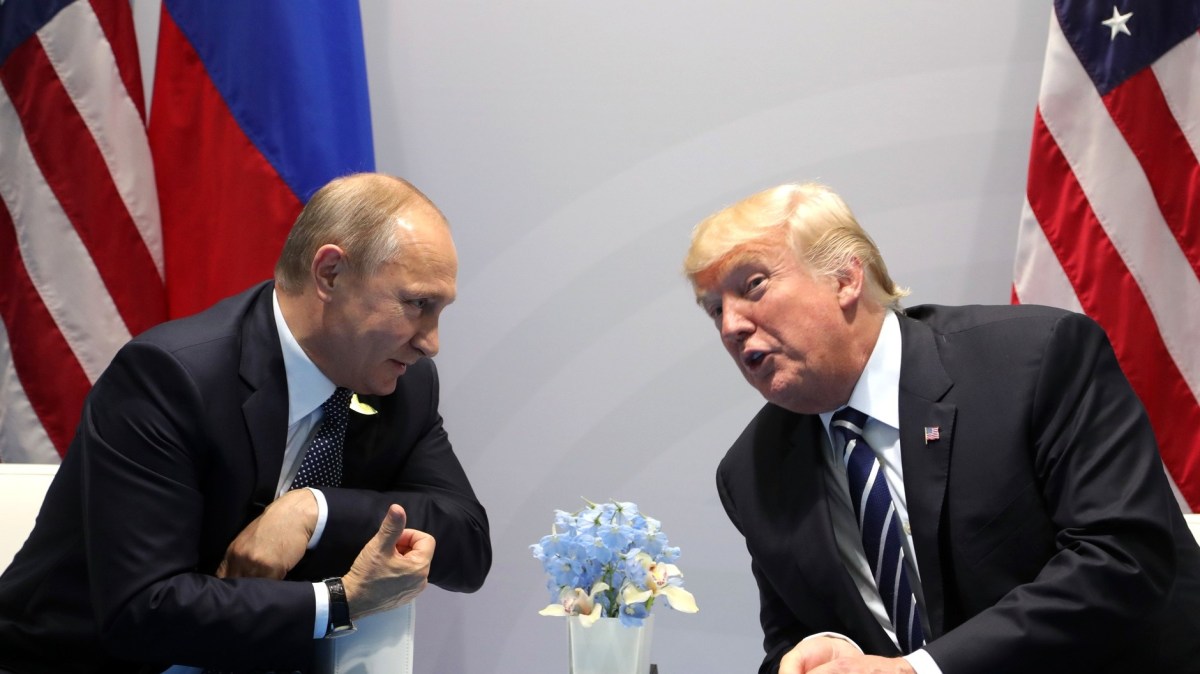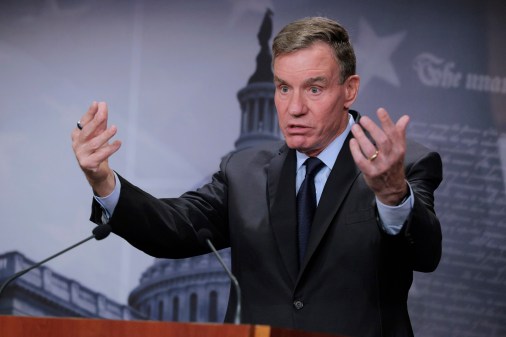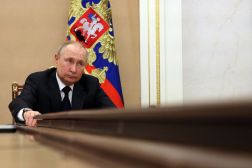Final Senate Intel report details remarkable contact between Trump campaign, Russian spies

President Donald Trump’s 2016 campaign manager was closely tied to a person the United States considers a Russian intelligence officer, and may have been involved in the Russian hack-and-leak operation targeting Hillary Clinton’s campaign in 2016, the Senate Intelligence Committee said in a bipartisan report released Tuesday.
Paul Manafort, Trump’s campaign manager, hired Konstantin Kilimnik, a Russian national and Ukrainian political operative, years ago to manage his consulting office in Ukraine, and had been working with Manafort since the mid-2000s, according to the Department of Justice. But while Special Counsel Robert Mueller previously said Kilimnik had “ties” to Russian intelligence, the bipartisan report identifies him as a Russian intelligence officer, and alleges that he has a possible connection to the Russian military’s hacking-and-dump scheme targeting Clinton and the Democratic National Committee in 2016.
“Kilimnik is a Russian intelligence officer,” states the committee’s fifth report, the final installment of the committee’s investigation into Russian election interference in 2016. “Kilimnik may have been connected to the GRU’s hack and leak operation targeting the 2016 U.S. election.”
The U.S. intelligence community has said for years that Russian President Vladimir Putin ordered the GRU’s 2016 influence campaign targeting the U.S. 2016 presidential elections. The report published Tuesday reveals remarkably detailed information on the extent to which then-candidate Trump’s associates were engaged with Russian intelligence, which sought to promote Trump’s candidacy and sow discord in American politics.
Manafort’s and Kilimnik’s communications are not well-documented, though there are two pieces of evidence the committee says tenuously tie Manafort to the GRU’s hack-and-leak scheme.
While that section of the committee’s findings is redacted, Manafort’s possible connection the hack-and-leak operation mentions his former son-in-law, Jeffrey Yohai, who was sentenced last year for several fraud schemes. Given the heavy redactions, it was unclear what connection Yohai might have to the information the committee has on the hack-and-leak.
Given his contacts with Russian intelligence, including Kilimnik, and his proximity to Trump, the committee concluded Manafort posed a “grave counterintelligence threat” to the United States in 2016. Manafort and Kilimnik both have been indicted for tampering with witnesses. Manafort also was convicted on bank and tax fraud charges, for which he was serving a years-long sentence behind bars until he was granted house arrest amid the coronavirus pandemic.
“The Committee found that Manafort’s presence on the Campaign and proximity to Trump created opportunities for Russian intelligence services to exert influence over, and acquire confidential information on, the Trump Campaign,” the report states. “Taken as a whole, Manafort’s high-level access and willingness to share information with individuals closely affiliated with the Russian intelligence services, particularly Kilimnik … represented a grave counterintelligence threat.”
Senators Martin Heinrich, D-N.M.; Dianne Feinstein, D-Calif.; Ron Wyden, D-Ore.; Michael Bennet, D-Colo.; and Kamala Harris, D-Calif., said Manafort’s ties with Russian intelligence and potential connection to the hack-and-leak look like “collusion” with Russia.
Ukraine conspiracy theories
The Russian government, Kilimnik, and Manafort also sought to spread false narratives alleging Ukraine had meddled in the U.S. election, not Russia, according to the committee, which suggests the effort appears to have been “coordinated.”
“Kilimnik almost certainly helped arrange some of the first public messaging that Ukraine had interfered in the U.S. election,” the report states. “Manafort embraced and promoted the narrative of Ukraine’s alleged involvement in the 2016 elections … Manafort worked with Kilimnik starting in 2016 on narratives that sought to undermine evidence that Russia interfered in the 2016 U.S. election.”
The conspiracy theory that Ukraine interfered in the 2016 U.S. election caught the attention of the president to the extent that by 2019 Trump had requested that Ukraine’s president help investigate the DNC hack in 2016.
Other Russian government personas have worked to spread the false theory that Ukraine was behind election interference in 2016 in the U.S., the committee found. In July of 2017, for example, Cyber Berkut, a GRU persona, “alleged on its blog that Ukraine had interfered in the 2016 U.S. elections,” the report states. The next day, @USA_Gunslinger, a “long-running false persona account of the Internet Research Agency,” the Russian government troll farm, tweeted about “Clinton and her campaign team’s collusion with Ukraine to interfere in the US election.”
Wyden called for the U.S. intelligence community to release more information about Russian proxies pushing false narratives that Ukraine interfered in the 2016 U.S. elections.
“This propaganda, pushed by a Russian intelligence officer and other Russian proxies, was the basis on which Donald Trump sought to extort the current government of Ukraine into providing assistance to his reelection efforts and was at the center of Trump’s impeachment and Senate trial,” Wyden said in a section of the report. “That is one of the reasons why the extensive redactions in this section of the report are so deeply problematic. Only when the American people are informed about the role of an adversary in concocting and disseminating disinformation can they make democratic choices free of foreign interference.”
The committee said it has observed “numerous Russian-government actors” spreading false narratives attempting to pour cold water on investigations into Russian election interference in 2016 in the U.S., as recently as January of 2020.
FBI and DNC communication issues
The committee also assessed that some of the FBI’s investigation of the DNC breach was “hindered” by its “victim-driven” approach, in which it relied on the DNC for access to computer systems. As a result, the FBI failed to investigate the hack “with the necessary urgency,” the committee concluded.
Part of the FBI’s difficulty in addressing the breach with urgency was that “instead of treating hacked entities as crime scenes, where the FBI can collect evidence as needed, the FBI treats hacked entities as victims,” the report states, adding that the DNC was hesitant to engage with the FBI given the tensions resulting from the FBI’s investigation into Clinton’s email servers. “The Committee found the FBI lacked a formal or considered process for escalating its warnings about the DNC hack within the organization of the DNC.”
Although the report states that “communication on both sides was inadequate,” the bipartisan review concluded the FBI should have done much more, and recommended the FBI develop a clear policy on escalating victim notifications within hacked entities, even when they’re not responsive.
“While the Committee understands that the FBI operates with limited resources and currently follows a victim-driven model when responding to cyber threats, it is clear to the Committee that the FBI could have, and should have, escalated its messages within the DNC much sooner than it did,” the report says.






